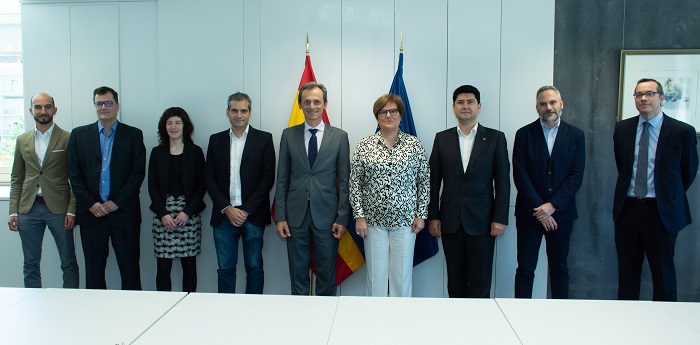
The Junior Academy of Spain has been created by the Ministry of Science, Innovation and Universities This new scientific institution represents and gives visibility to young scientists, preferably in the field of experimental sciences.
Last July, the General Assembly of the International Union of Pure and Applied Chemistry (IUPAC) elected Javier García, also professor of Inorganic Chemistry at the University of Alicante, as president of this organisation for the 2022-2023 biennium. Until that date, he has held the position of vice-president.
To coincide with the International Year of the Periodic Table and the centenary of IUPAC, this international organisation held its General Assembly in Paris, where the new challenges facing world chemistry for the next 100 years were analysed. During the meeting, voting took place to appoint the next president, and Javier García was elected to lead the organisation's presidency from 2022 onwards.
The professor at the University of Alicante and professor at the Rafael del Pino Foundation has until now been a member of the IUPAC Executive Committee and vice-president of its Division of Inorganic Chemistry. This is the first time that a Spaniard will head the organisation. For Javier García, "being at the head of an organisation of this size and scope is not only an honour, but also a great opportunity to try to put Spanish science in the place it deserves".
Objectives of the Youth Academy
With the creation of the Academia Joven de España, García stressed, "Spain joins the network of more than 40 Young National Academies that exist around the world". "We are committed to working with the rest of the Spanish Academies and with all the Young Academies to boost scientific and intellectual activity in our country and to give a voice, recognition and opportunities to young Spanish scientists", he added in his speech.
The members of the Academia Joven de España will be members for five years in order to allow scientists of successive generations to join and to ensure the youthfulness of its academics. The profile of the members of this Academy will coincide with the average of 40 years of age and 12 years from the attainment of a doctoral degree, as a young scientist is understood to be one who has reached maturity and is at the beginning of his or her independent research career.
The Academy will act as a link with young scientists working abroad, as some of its members may be young nationals doing research outside our country.
The existing Academies have the wisdom and cultural depth of their background and history. Complementing these Academies, there is a need for generational rapprochement and reciprocal networking between the experienced scientists and the young researchers who will shape the cultural future of the countries.
This is why experienced scientists took the initiative to establish the Global Youth Academy in Berlin in 2010, which aims to be the voice of the world's young scientists, encouraging them to work together to address issues of global importance in science, education and research. It brings together 200 leading young scientists, averaging 35 years of age, from 58 countries. This initiative was followed by the creation of the Young Academy of Europe in 2012. Today, there are already 40 National Young Academies around the world.
To the front of IUPAC
Javier García will take over from Chris Brett, Professor of Physical Chemistry at the University of Coimbra in Portugal, with whom he will continue to serve as Vice-President until 2022. According to Javier García, "as the International Union of Pure and Applied Chemistry enters its second centenary, we look to the future committed to improving our quality of life through chemistry and to a more sustainable future".
IUPAC was founded in 1919 by chemists from academia and industry. Over the past 100 years, the Union has created the common language of chemistry, standards, verified data, best practices in chemistry, and promoted chemistry education and collaboration in academia and industry. IUPAC is the world authority on recognising and naming the chemical elements and arranging them in the periodic table.
The Union sponsors international meetings at the highest level and funds projects all over the world. During the Cold War, IUPAC played an important role in maintaining scientific dialogue between scientists of different nationalities. Today, the Union looks to its new centenary with a focus on the Sustainable Development Goals, the application of artificial intelligence to chemistry, and a commitment to diversity.


